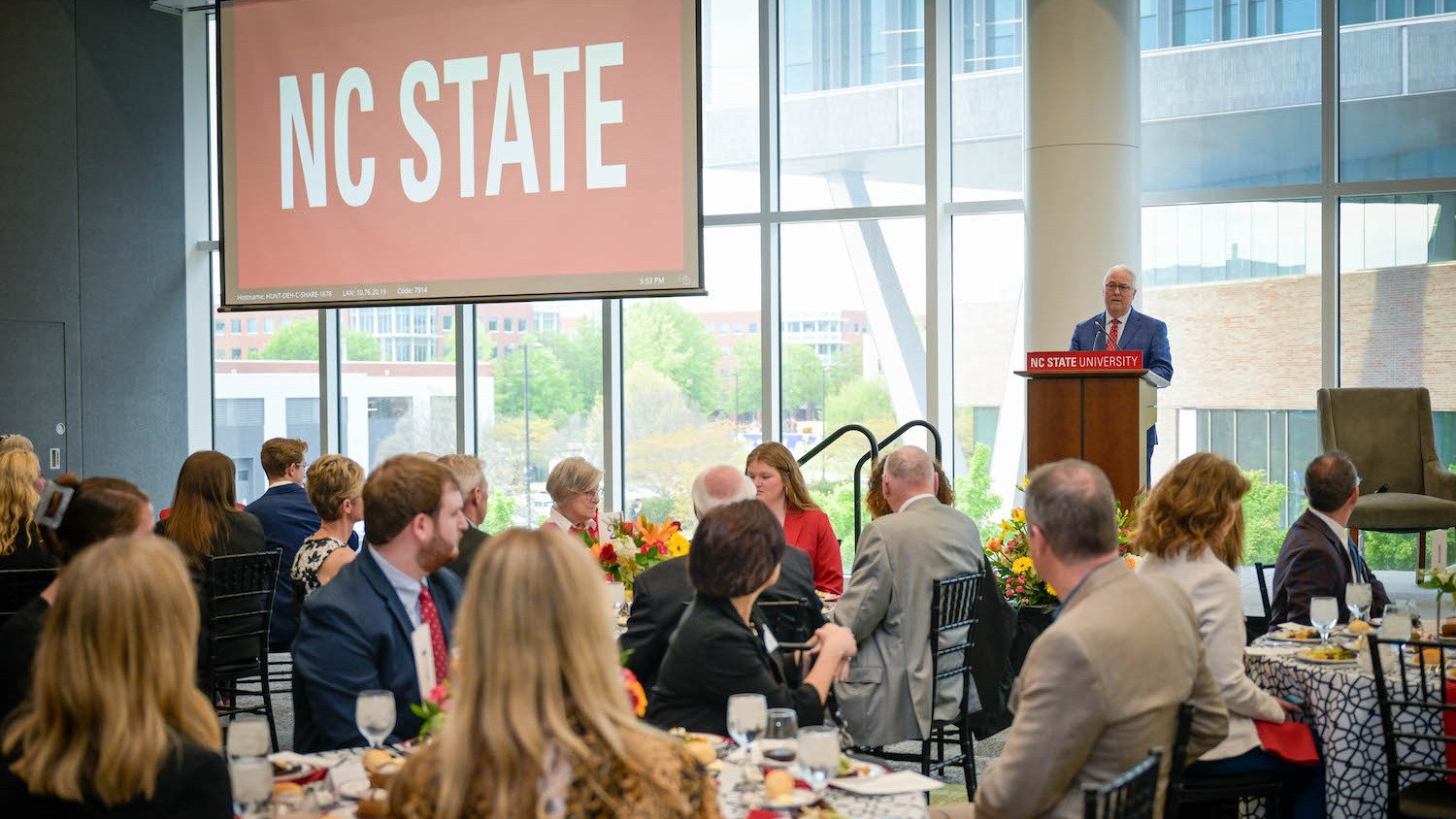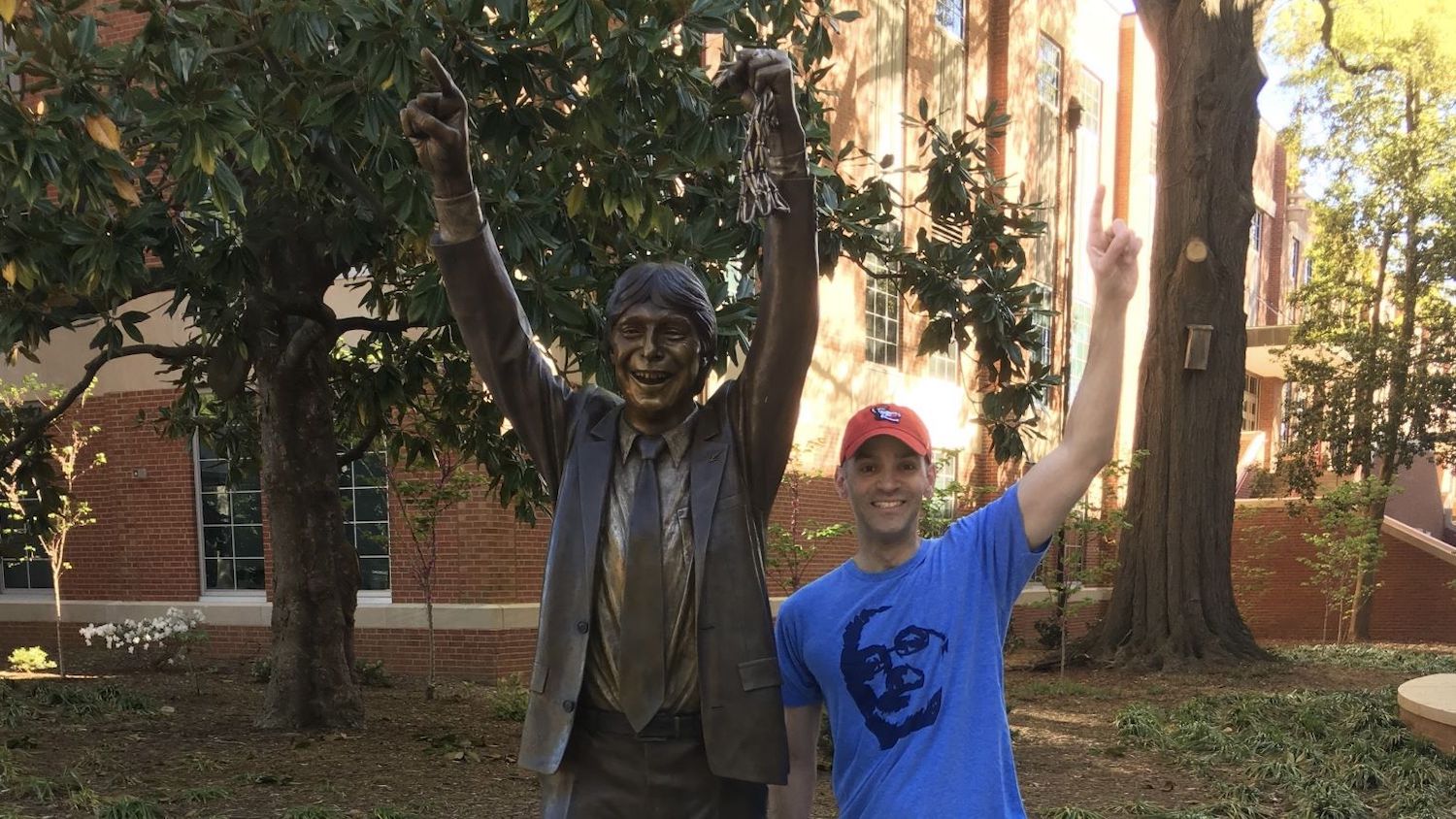Foundation Funding Helps WKNC 88.1 Keep On Keeping On
A grant from the NC State University Foundation is enabling the Pack’s student-run radio station to repair and repaint its transmission tower.
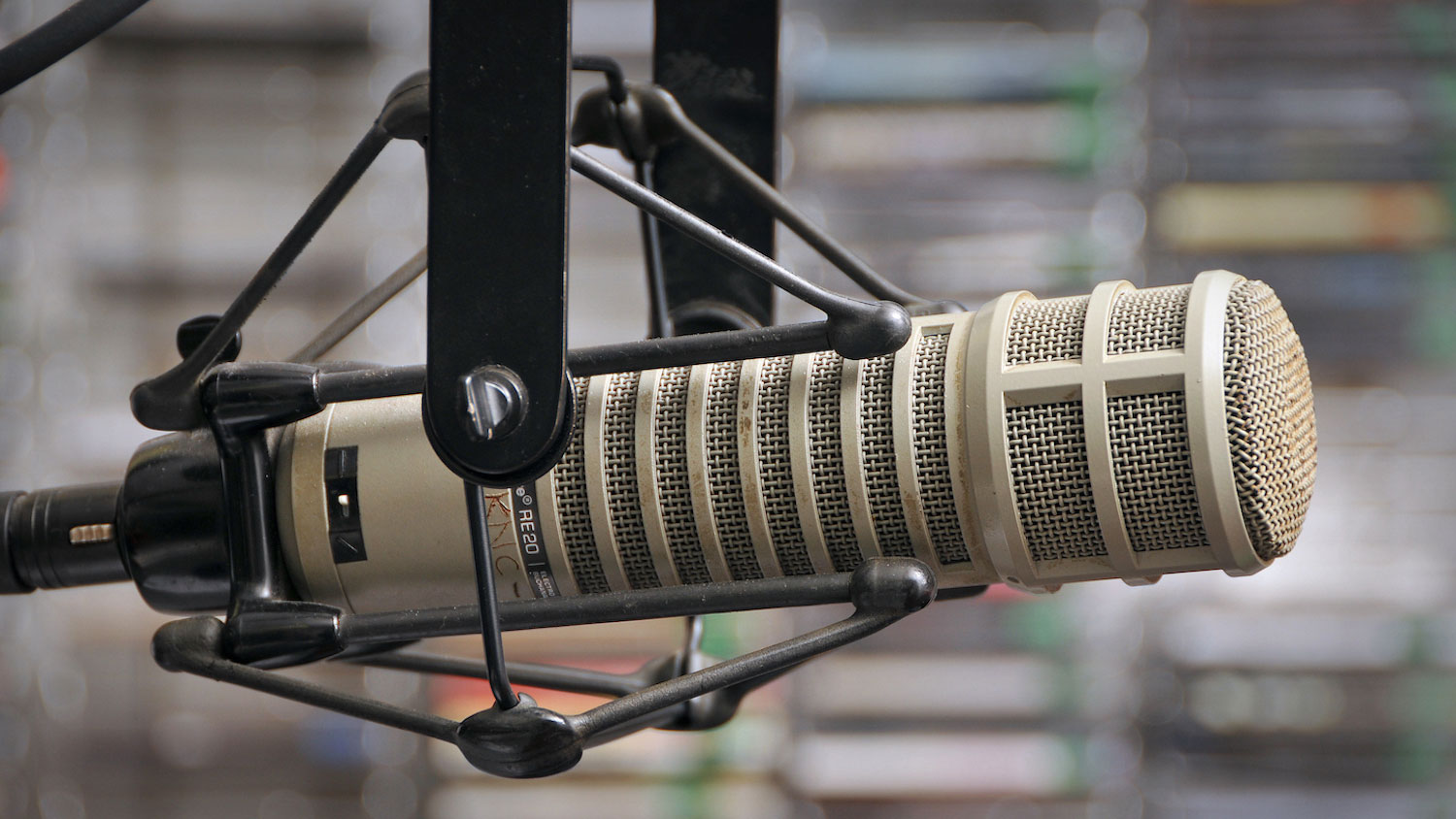
The NC State University Foundation Inc. recently awarded an $8,500 grant to WKNC 88.1 FM HD-1/HD-2 as part of the Foundation’s annual board meeting. This important funding will allow NC State’s student-run, noncommercial radio station to repaint and repair its transmission tower, ensuring the structure complies with Federal Communications Commission (FCC) and Federal Aviation Administration (FAA) standards for many years to come.
The 80-foot-tall, steel transmission tower is mounted on the roof of D.H. Hill Jr. Library. WKNC has used the tower to broadcast for decades, but NC State only took official possession of it in February 2016. The tower was owned by MCNC, a nonprofit networking-technology company headquartered in Research Triangle Park, prior to that.
The FCC and FAA require high-visibility colors be applied to the tower in a contrasting pattern to alert low-flying planes, helicopters and drones to its presence. Fittingly for NC State, that means alternating swathes of red and white currently make their way up the tower. However, years of chipping and peeling have left many bare patches of metal on the tower, leading to significant rust. The rust, in turn, could lead to major structural issues if left untreated.
Patrick Neal, director of Student Media Advising, wrote in the grant proposal to the Foundation Board that no one is sure when the tower was last painted, but he is confident it has been at least 25 years.
“Obviously, the economics of Student Media have changed a bit in that time, and so we just haven’t been able to focus on getting the tower painted,” said Jamie Lynn Gilbert, associate director of Student Media. “I think the current budget is about $900,000, and that seems like a lot and, you know, $8,500 isn’t [a lot] when you try to put it in, but what do you take out?
“Do you take out sending a student to a conference and denying them that educational opportunity?” Gilbert added. “Do you take out having another copy editor on staff and possibly opening yourself up to liability with getting facts wrong? We don’t ever want to take out any opportunity for a student, so it’s difficult to get that tower-painting in there.”
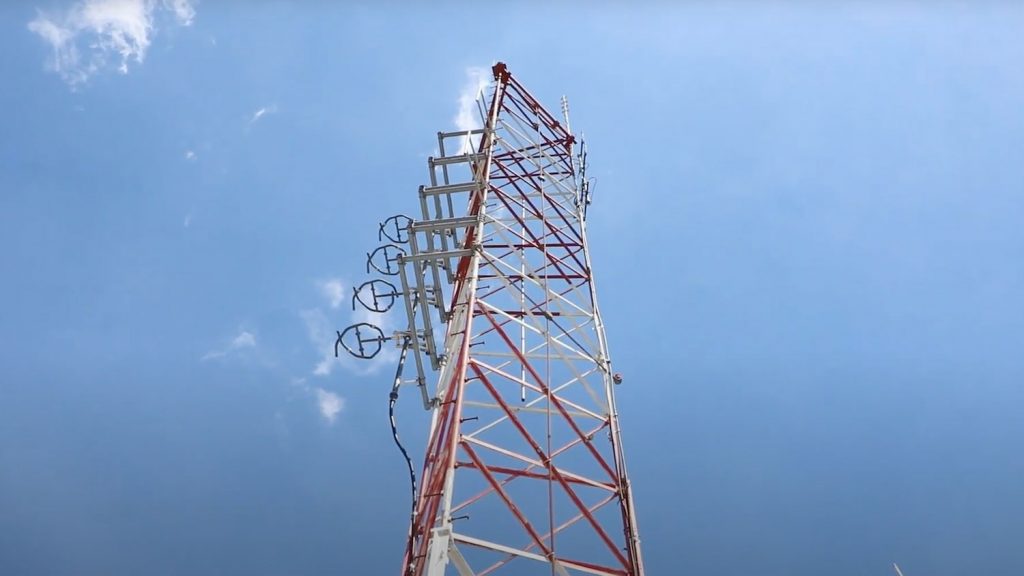
The tower is also in need of a new beacon. The light that sits atop the structure serves the same purpose at night that the paint does during the day: to warn off approaching aircraft. An LED beacon is now required by the federal government in place of the conventional bulb currently installed. NC State officials expect the replacement will cut power consumption by 90% and dramatically reduce the frequency of bulb-changing required by the university.
Repainting the tower is estimated to cost $3,300; installing a new beacon, $5,200. Gilbert said the improvements should keep the tower in compliance with FAA and FCC regulations into at least the 2030s.
“It might end up costing more than that, but it’s an expensive thing that we have to do, and we just have never been able to secure the funding for it,” Gilbert said. “We are incredibly grateful to the NC State Foundation for this opportunity.”
“WKNC holds a special place in the hearts of many NC State alumni,” said Mike Constantino, chair of the Foundation Board of Directors. “It is the literal voice of the Wolfpack and elicits many fond memories from alumni who tuned in to regular programs across many musical genres.
“Repairing the tower atop D.H. Hill Jr. Library and replacing the warning beacon with an efficient LED unit was a no-brainer,” Constantino added. “Being able to fund a unique request for an iconic part of campus life was an excellent way for us to provide support that will benefit the entire university community.”
On the Air and Everywhere
NC State student radio has been in continuous operation since 1944 and has been known as WKNC 88.1 since 1966. WKNC broadcasts at 25,000 watts, putting it in the top 10 for student-run, university-licensed radio stations in the U.S. in terms of wattage and coverage pattern. The transmission tower is a vital part of that capability, allowing NC State to reach listeners within roughly an hour’s radius of campus — a potential audience of approximately 1.5 million people.
“I have heard us in Fayetteville. I have heard us in Elon,” Gilbert said. “There’s a joke that you can hear WKNC in Chapel Hill, but you can’t hear WXYC (UNC-Chapel Hill’s student-run radio station) in Raleigh. And of course we’re online 24/7/365, so we have listeners throughout the world sometimes.”
The station’s online capability enables alumni, study-abroad students and more to keep in touch with NC State even when they’re away from Raleigh. It has been especially helpful over the last year and a half, too, allowing members of the Pack to stay in touch with campus even while learning and working remotely.
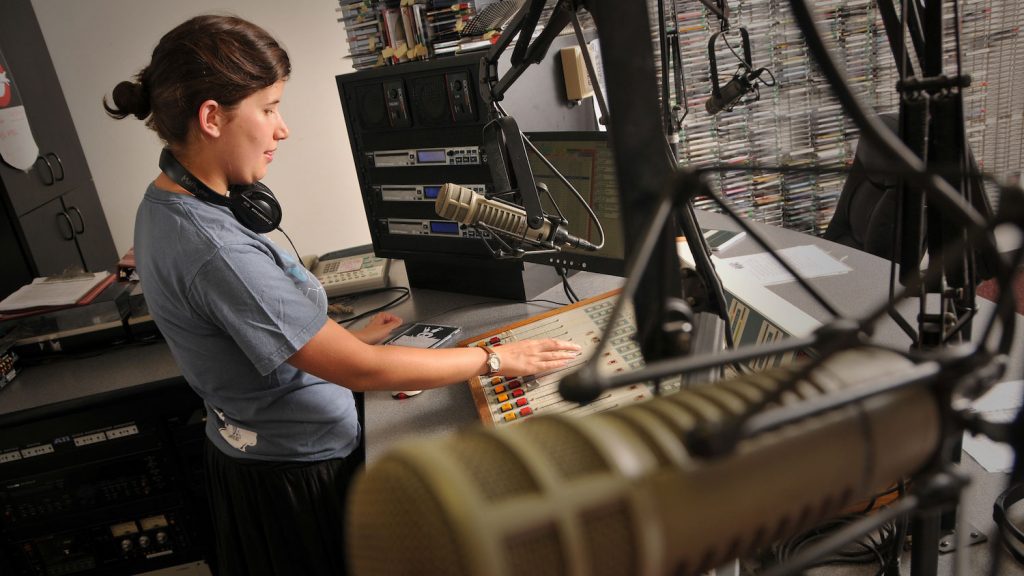
WKNC has 120 students on staff in a typical academic year, including about 20 paid employees — from management staff and music directors to content creators for the station’s blog, YouTube channel and podcasts — and as many as 100 non-paid DJs.
“We provide a good service to students at the university to help sharpen their skills,” Gilbert said. “Most of them do not go into radio, which is fine because they still … learn a tremendous amount at WKNC.
“Broadcasting is a business, and that’s how we treat the radio station,” Gilbert added. “Yeah, it’s a lot of fun, but … We’re not playing radio. We want to make sure that we serve the community as much as possible.”
WKNC does that by bringing a wide range of programming — a mix of indie rock, electronic, underground hip-hop and metal — to the airwaves each day. On Sunday mornings, for instance, WKNC presents Geet Bazaar, a two-hour block of music from South Asian countries such as India, Bangladesh and Sri Lanka. The show is hosted in English and Hindi/Urdu, with the playlist featuring songs in more than a dozen languages.
WKNC is also a proud supporter of Wolfpack Athletics, airing every home and away game for women’s basketball and men’s baseball. The tower makes all of that and more possible, and it even serves as a backup for campus police if the department’s primary communications system ever goes down.

The tower represents the final piece of the puzzle for WKNC in its efforts to provide more and ever better content to the Triangle and beyond.
“This is pretty much the last step in our evolution,“ Gilbert said. “We worked very hard for the past few years to really upgrade all of our studios. We went HD. We reconfigured our antenna pattern. We launched an HD-2 station — basically, we doubled our online capabilities.”
HD-1 is the original WKNC format of indie rock from 6 a.m. to 6 p.m. and electronic, underground hip-hop or metal from 6 p.m. to 6 a.m. The inverse is true of HD-2. The extra channel allows more DJs to get time on the air, as hip-hop, metal and electronic were only played on HD-1 when many of the students were busy working. DJs now get their start on HD-2 and can then work their way onto HD-1 if they so desire.
Part of a Larger Pack
The grant given to WKNC wasn’t the only funding distributed by the NC State University Foundation this year, though. The radio station was one of several campus entities to be awarded a grant in 2021 by the Foundation, which annually accepts proposals from affiliated colleges and business units and announces which ones its board members have voted to fund during its annual board meeting. This year’s meeting saw 17 proposals made and 10 accepted.
“The NC State Foundation Board of Directors is proud to sponsor this competitive grant award process to encourage innovative, unique and interesting projects across our constituent colleges and business units,” Constantino said. “It is tremendously rewarding for the board to see how these projects perform and the lasting impact many of them have on our university. It also allows students and faculty to pilot ideas that need a little seed-funding. This is the epitome of ‘Think and Do the Extraordinary.’”
While the Foundation’s annual support is always notable, board members went above and beyond this year by personally contributing to the grants in order to make 10 possible. In total, the Foundation awarded $183,400 — $160,000 through the allotted Foundation funding and the remaining $23,400 via direct contributions from board members.
This year’s other grant recipients include:
- The College of Design’s Reach Out, A Community Outreach Initiative ($25,000). The initiative aims to foster a more inclusive environment within the college and introduce hundreds of pre-college students to design each year. The pilot program will include after-school programming and field trip opportunities to expose students and teachers to the benefits of design thinking and design career paths.
- The College of Design’s Mixed Reality for Social Impact ($25,000). This project builds on the successful educational use of virtual reality by Art + Design associate professor and department head Derek Ham. In 2018, Ham completed and released the VR experience I Am a Man, which tells the story of the 1968 Memphis sanitation workers’ strike and captures the final moments of Martin Luther King Jr.’s life just before he was assassinated. The Mixed Reality for Social Impact project will build on I Am a Man’s success by creating additional VR experiences to help foster increased empathy and altruism among opposing groups in order to help them heal their communities.
- The College of Education’s Wolf 2 Wolf: Strengthening the Pack through Educator Virtual Networks program ($25,000). The Office of Professional Education has proposed creating Wolf 2 Wolf to provide virtual learning networks among NC State prepared educators. These networks will foster mentoring relationships between experienced and beginning teachers, create opportunities for professional development and build a sense of community among NC State graduates across the state.
- The Division of Academic and Student Affairs’ TRIO Pre-College program ($7,500). The program seeks to enhance the quality of NC State’s undergraduate and graduate experience by creating a robust, nationwide, virtual recruitment initiative that will simultaneously challenge the university to be globally competitive in recruitment areas and diversify its student body by focusing on first-generation, low-income students and students with disabilities.
- Feed the Pack’s Pop-Up Food Pantry ($10,000). The pop-up pantry will enhance the service of the brick-and-mortar pantry currently located in the Quad Commons Building on Central Campus. Feed the Pack will be better able to meet people where they are rather than relying on them to come to Central Campus, and part of the funding will be used for additional food items, hygiene items, storage materials and other needs. The overall goal is to expand Feed the Pack’s efforts in order to better serve the Wolfpack family with dignity and respect.
- NC State University Libraries’ State of Sound: Podcast HQ ($25,000). This initiative will help aggregate current NC State podcasts into a single, easy-to-find location for both the campus community and the overall podcast-listening community. Podcast HQ will also assist podcast creators to better understand and obtain distribution through major podcast channels, as well as teach those interested in podcasting how to prepare, record and share podcasts. It will also provide equipment and offer training for current and potential podcasters.
- The Poole College of Management’s Technology Entrepreneurship and Commercialism, or TEC ($10,000). TEC aims to address the strategic need identified by NC State for truly interdisciplinary education — in this case, the commercialization of technology through new business startups and analysis of real intellectual property. To that end, a website will be developed to recruit both MBA and STEM graduate students, with the site including all course and program information, stories of recent TEC student team successes, job opportunities for graduates and more.
- The Poole College of Management’s Growth Mindsets in Management ($25,000). The program will develop and implement a theory-driven, scalable intervention for all Poole College of Management students with the goal of shifting five specific mindsets: entrepreneurship, leadership, creativity, intelligence and people. Additionally, it expects to see a shift in students’ self-efficacy for identifying value-creating opportunities and behavioral intentions following challenges/setbacks.
- The Poole College of Management’s Poole Pack Leaders ($22,400). The proposed program seeks to legitimize and leverage the current Peer Leaders infrastructure in support of undergraduate leadership development across the college; more effectively connect Poole students to all leadership development opportunities offered, including the Poole Leadership Program; and provide increased, personalized support for all Poole College of Management first-year undergraduate students, focusing on leadership development and co-curricular involvement.
- Categories:

